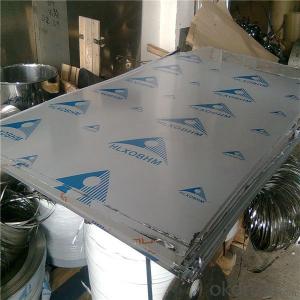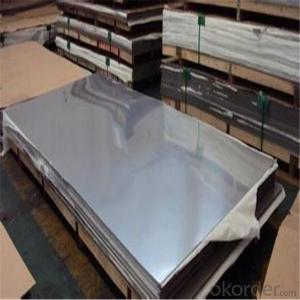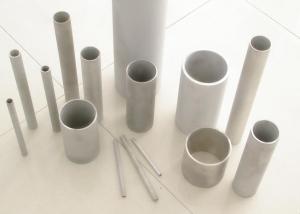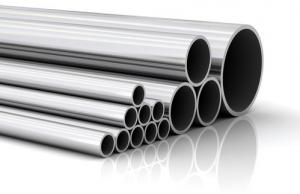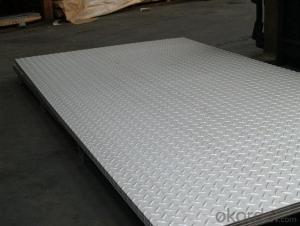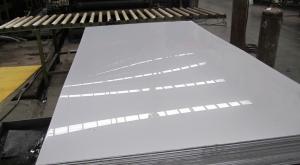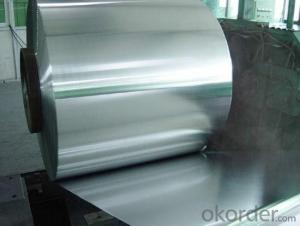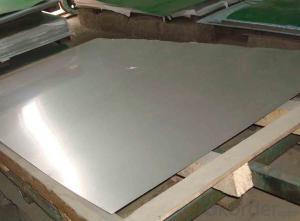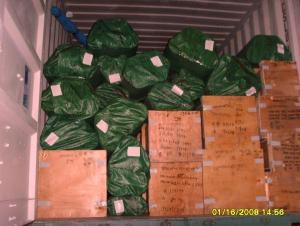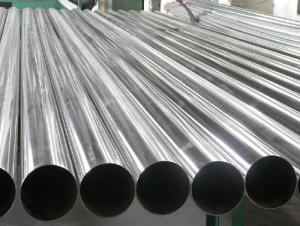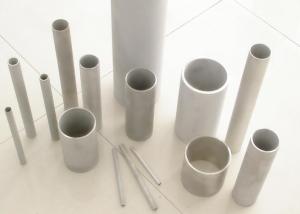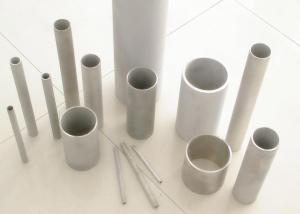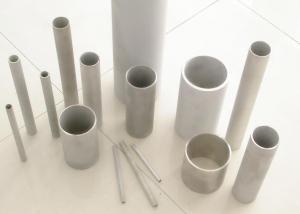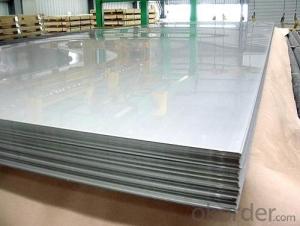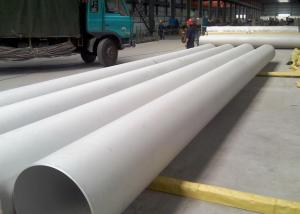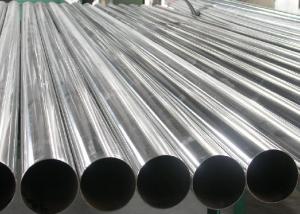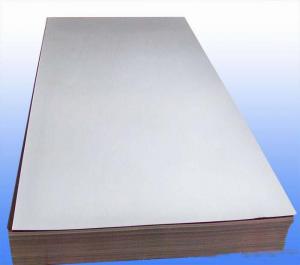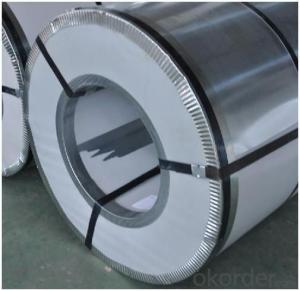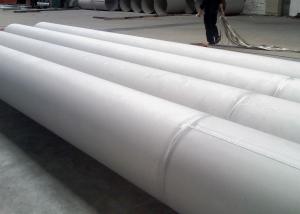Stainless Steel Sheet ASME 420 430 426 grade
- Loading Port:
- Shanghai
- Payment Terms:
- TT OR LC
- Min Order Qty:
- 7 m.t.
- Supply Capability:
- 1000 m.t./month
OKorder Service Pledge
OKorder Financial Service
You Might Also Like
Item specifice
Stainless steel sheet ASME 420 430 426 grade
Product Description
AISI 304( 18Cr-8Ni ) stainless steel is one of Austenitic stainless steel.
As a versatile steel, it has good corrosion resistance, heat resistance, low temperature strength
and mechanical properties. Meanwhile, it is quite good in pressing, bending and other thermal
processing.
Standard: ASTM A240 / A240M
Grade: 304 / 304L / 316 / 316L / 321 / 310S / 309S / 409 / 426 / 420 / 430 / 201...
Size: 1000*2000mm, 1220*2440mm, 1250*2500mm, 1500*3000/6000mm, 2000*6000mm
Special size can customized
Thickness: 0.3-20mm
Brand: TISCO, ZPSS, JISCO, BAO STEEL, LISCO
Surface: 2B, 2BA, BA, 1D, NO.1, NO.4, HL, Mirror, 8K
Chemical Composition
C | Cr | Ni | Mn | P | S | Mo | Si | |
304 | ≤0.07 | 17.00-19.00 | 8.00-10.00 | ≤2.00 | ≤0.035 | ≤0.030 | - | ≤1.00 |
304L | ≤0.030 | 18.00-20.00 | 8.00-10.00 | ≤2.00 | ≤0.035 | ≤0.030 | - | ≤1.00 |
316L | ≤0.030 | 16.00-18.00 | 12.00-15.00 | ≤2.00 | ≤0.035 | ≤0.030 | 2.00-3.00 | ≤1.00 |
317 | ≤0.12 | 18.00-20.00 | 11.00-15.00 | ≤2.00 | ≤0.035 | ≤0.030 | 3.00-4.00 | ≤1.00 |
317L | ≤0.08 | 18.00-20.00 | 11.00-15.00 | ≤2.00 | ≤0.035 | ≤0.030 | 3.00-4.00 | ≤1.00 |
309S | ≤0.08 | 22.00-24.00 | 12.00-15.00 | ≤2.00 | ≤0.035 | ≤0.030 | - | ≤1.00 |
310S | ≤0.08 | 24.00-26.00 | 19.00-22.00 | ≤2.00 | ≤0.035 | ≤0.030 | - | ≤1.00 |
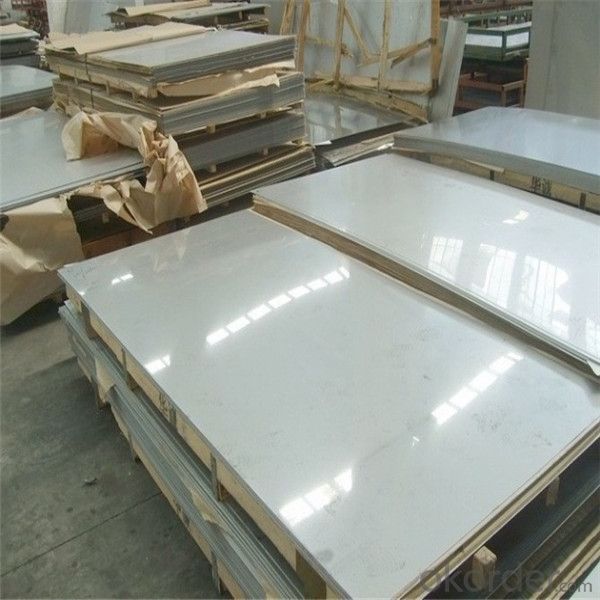
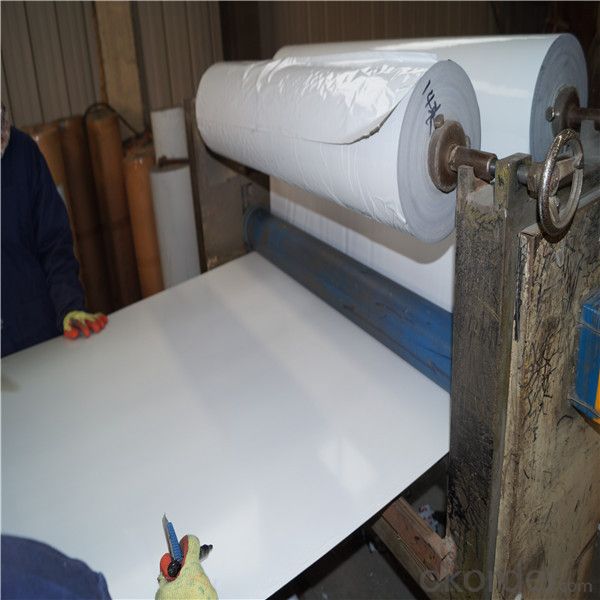
3. Applications
Stainless steel’s resistance to corrosion and staining, low maintenance and familiar lustre make it an ideal material for many applications. There are over 150 grades of stainless steel, of which fifteen are most commonly used. The alloy is milled into coils, sheets, plates, bars, wire, and tubing to be used in cookware, cutlery, household hardware, surgical instruments, major appliances, industrial equipment (for example, in sugar refineries) and as an automotive and aerospace structural alloy and construction material in large buildings. Storage tanks and tankers used to transport orange juice and other food are often made of stainless steel, because of its corrosion resistance and antibacterial properties. This also influences its use in commercial kitchens and food processing plants, as it can be steam-cleaned and sterilized and does not need paint or other surface finishes.
- Q:How do stainless steel sheets differ from other types of metal sheets?
- Stainless steel sheets differ from other types of metal sheets in several ways. Firstly, stainless steel is an alloy that contains a minimum of 10.5% chromium. This chromium content forms a protective layer of chromium oxide on the surface of the metal, making it highly resistant to corrosion and staining. This unique property sets stainless steel sheets apart from other metals, as they can withstand exposure to harsh environments, chemicals, and moisture without deteriorating. Secondly, stainless steel sheets offer excellent strength and durability. Due to their composition, stainless steel sheets are highly resistant to heat, impact, and wear. This makes them suitable for a wide range of applications, including automotive, construction, and industrial settings, where strength and endurance are crucial. Another important distinction is the aesthetic appeal of stainless steel sheets. They have a sleek and modern appearance, which is highly sought after in architectural and interior design projects. Stainless steel sheets can be easily polished to a mirror-like finish, adding an elegant touch to any space. Moreover, stainless steel sheets are known for their hygiene and cleanliness. They have a non-porous surface that does not absorb moisture, making them resistant to bacteria, mold, and other contaminants. This makes stainless steel sheets the material of choice for kitchen appliances, food processing equipment, and medical devices. Lastly, stainless steel sheets are highly customizable. They can be manufactured in various thicknesses, sizes, and finishes to meet specific requirements. Additionally, stainless steel can be easily formed, welded, and fabricated, allowing for creative designs and customization options. In summary, stainless steel sheets differ from other types of metal sheets due to their exceptional corrosion resistance, strength, durability, aesthetic appeal, hygiene, and customization options. These unique characteristics make stainless steel sheets a versatile and reliable choice for a wide range of applications.
- Q:Can stainless steel sheets be used for kitchen sinks?
- Yes, stainless steel sheets can be used for kitchen sinks. Stainless steel is a popular and durable material choice for kitchen sinks due to its resistance to corrosion, heat, and staining. It is also easy to clean and maintain, making it a suitable option for a kitchen sink.
- Q:What are stainless steel sheets used for?
- Stainless steel sheets are used for a variety of applications across various industries. Due to their excellent corrosion resistance, durability, and aesthetic appeal, these sheets are widely utilized in both commercial and residential settings. In the construction industry, stainless steel sheets are used for roofing, cladding, and facades, as they can withstand harsh environmental conditions and provide a modern, sleek appearance. In the automotive industry, they are commonly used for manufacturing car bodies, exhaust systems, and decorative trims. Moreover, stainless steel sheets find extensive use in the food and beverage industry, where their hygienic properties make them suitable for kitchen equipment, countertops, and food processing machinery. Additionally, these sheets are employed in medical equipment, pharmaceuticals, and laboratory settings due to their resistance to corrosion and easy cleanability. Other applications include furniture, appliances, signage, and decorative purposes, as stainless steel sheets can be easily customized and formed into various shapes and sizes. Overall, stainless steel sheets are a versatile material that meets a wide range of needs across different industries, thanks to their durability, strength, and corrosion resistance properties.
- Q:Can stainless steel sheets be used for signage or lettering?
- Indeed, signage or lettering can make use of stainless steel sheets. Stainless steel, a remarkably durable and adaptable material, finds wide application in signage and various other fields. It possesses exceptional resistance to corrosion, rendering it suitable for both indoor and outdoor utilization. With stainless steel sheets, it becomes effortless to fabricate and shape them into diverse dimensions, enabling the creation of personalized signage and lettering designs. Moreover, stainless steel imparts a sleek and contemporary look, making it a captivating choice for signage in commercial or professional environments. In conclusion, stainless steel sheets offer a dependable and enduring solution for all your signage and lettering requirements.
- Q:Are stainless steel sheets suitable for food processing or medical applications?
- Yes, stainless steel sheets are highly suitable for food processing and medical applications. Stainless steel is a popular choice in these industries due to its numerous beneficial properties. Firstly, stainless steel is resistant to corrosion, making it ideal for environments where hygiene and cleanliness are of utmost importance, such as food processing plants and medical facilities. Secondly, stainless steel is a non-porous material, meaning it does not absorb or retain bacteria, germs, or odors. This makes it easy to clean and maintain high levels of sanitation, crucial in food processing and medical settings where contamination must be minimized. Additionally, stainless steel has excellent strength and durability, allowing it to withstand harsh conditions, heavy use, and frequent cleaning without deteriorating. This makes stainless steel sheets a reliable and long-lasting choice for these demanding applications. Furthermore, stainless steel is non-reactive with food and many medical substances, ensuring that it does not leach any harmful chemicals or contaminants into the products being processed or the patients being treated. This is crucial for maintaining the safety and integrity of both food and medical materials. In conclusion, stainless steel sheets are highly suitable for food processing and medical applications due to their corrosion resistance, non-porous nature, strength, durability, and non-reactive properties. Choosing stainless steel ensures the highest standards of hygiene, cleanliness, and safety in these industries.
- Q:Are stainless steel sheets corrosion-resistant?
- Yes, stainless steel sheets are corrosion-resistant. Stainless steel is specifically designed to resist corrosion and staining, making it an ideal material for various applications. The high levels of chromium in stainless steel create a protective layer on the surface, which prevents rust and corrosion from forming. This makes stainless steel sheets suitable for use in environments where they may be exposed to moisture, chemicals, or other corrosive substances. Additionally, stainless steel sheets can withstand high temperatures and have excellent durability, further enhancing their corrosion-resistant properties.
- Q:What is the difference between brushed and polished stainless steel sheets?
- Brushed and polished stainless steel sheets differ in terms of their appearance and texture. Brushed stainless steel sheets have a textured, matte finish that is achieved by brushing the stainless steel surface with an abrasive material. This creates a series of parallel lines or a pattern on the metal, giving it a distinctive look. The brushed finish helps to hide scratches and fingerprints, making it a popular choice for applications where durability is important. On the other hand, polished stainless steel sheets have a smooth, glossy finish that is achieved by polishing the surface with a fine abrasive compound. This process removes any imperfections or scratches on the metal, resulting in a mirror-like reflection. The polished finish is more reflective and visually appealing, making it commonly used in decorative applications where aesthetics are a priority. In summary, the main difference between brushed and polished stainless steel sheets lies in their appearance and texture. While brushed stainless steel sheets have a textured, matte finish that is more resistant to scratches and fingerprints, polished stainless steel sheets have a smooth, glossy finish that provides a mirror-like reflection. The choice between brushed and polished stainless steel sheets depends on the desired aesthetic and the specific application requirements.
- Q:How do you prevent galling when using stainless steel sheets?
- To prevent galling when using stainless steel sheets, it is important to apply a lubricant or anti-seize compound on the surface before any contact or movement occurs. This helps to reduce friction and allows for smoother motion, preventing the occurrence of galling. Additionally, using proper tools and techniques, such as using low cutting speeds and avoiding excessive pressure, can also help prevent galling in stainless steel sheet applications.
- Q:Can stainless steel sheets be used for elevator door frames?
- Yes, stainless steel sheets can be used for elevator door frames. Stainless steel is a popular material choice for elevator door frames due to its durability, corrosion resistance, and aesthetic appeal. It can withstand the constant wear and tear of opening and closing, as well as the various cleaning agents used in elevator maintenance. Stainless steel also provides a sleek and modern look that complements the overall design of the elevator. Additionally, stainless steel is easy to clean and maintain, making it a practical choice for elevator door frames.
- Q:What is the density of stainless steel sheets?
- The density of stainless steel sheets can vary depending on the specific grade and thickness of the sheet. However, on average, stainless steel sheets have a density of about 8,000 kilograms per cubic meter (kg/m³) or 8 grams per cubic centimeter (g/cm³). This high density is one of the reasons why stainless steel is known for its strength and durability.
1. Manufacturer Overview |
|
|---|---|
| Location | |
| Year Established | |
| Annual Output Value | |
| Main Markets | |
| Company Certifications | |
2. Manufacturer Certificates |
|
|---|---|
| a) Certification Name | |
| Range | |
| Reference | |
| Validity Period | |
3. Manufacturer Capability |
|
|---|---|
| a)Trade Capacity | |
| Nearest Port | |
| Export Percentage | |
| No.of Employees in Trade Department | |
| Language Spoken: | |
| b)Factory Information | |
| Factory Size: | |
| No. of Production Lines | |
| Contract Manufacturing | |
| Product Price Range | |
Send your message to us
Stainless Steel Sheet ASME 420 430 426 grade
- Loading Port:
- Shanghai
- Payment Terms:
- TT OR LC
- Min Order Qty:
- 7 m.t.
- Supply Capability:
- 1000 m.t./month
OKorder Service Pledge
OKorder Financial Service
Similar products
New products
Hot products
Related keywords
